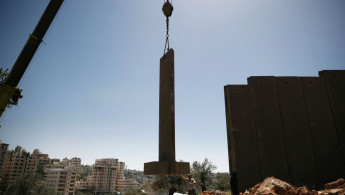No olives for Palestine: Israel's latest barrier-building
The construction began with the lifting of several eight-metre-high blocks expected to complete the 670km (420 mile) barrier.
Nicola Khamis, mayor of Beit Jala on the outskirts of Bethlehem city, condemned what he saw as a land-grab.
"This land is for our families, our children," he told AFP.
Israel's high court ignored a ruling by the International Court of Justice - which declared the construction of the barrier illegal - ruling it was indeed legitimate, following a nine-year legal battle, in July 2015.
But the latest piece is expected to add to the suffering of the Palestinian Christian community.
"Without this land all the Christians will leave this country," Khamis said. "It is impossible to build in Beit Jala. We want to widen Beit Jala."
Construction of the controversial structure - dubbed the "apartheid wall" by Palestinians who point to the barrier being constructed entirely within the occupied territories, annexing swathes of land well beyond the 1967 "Green Line" to Israel proper - started during the height of the second Palestinian intifada in 2002.
"It is consistent with the Israeli government's policy of consolidating apartheid in the West Bank," Xavier Abu Eid, a spokesman for the Palestine Liberation Organisation, said of Thursday's construction.
"It destroys the prospects for Bethlehem to grow".
The wall was found to be illegal under international law and the UN General Assembly demanded it be dismantled. It snakes for hundreds of kilometres around urban Palestinian areas, separating farmers from their agricultural land and severing road links between towns. The annexed land is attached to Israeli-only settlement blocs, also deemed illegal under international law.


![President Pezeshkian has denounced Israel's attacks on Lebanon [Getty]](/sites/default/files/styles/image_684x385/public/2173482924.jpeg?h=a5f2f23a&itok=q3evVtko)



 Follow the Middle East's top stories in English at The New Arab on Google News
Follow the Middle East's top stories in English at The New Arab on Google News


